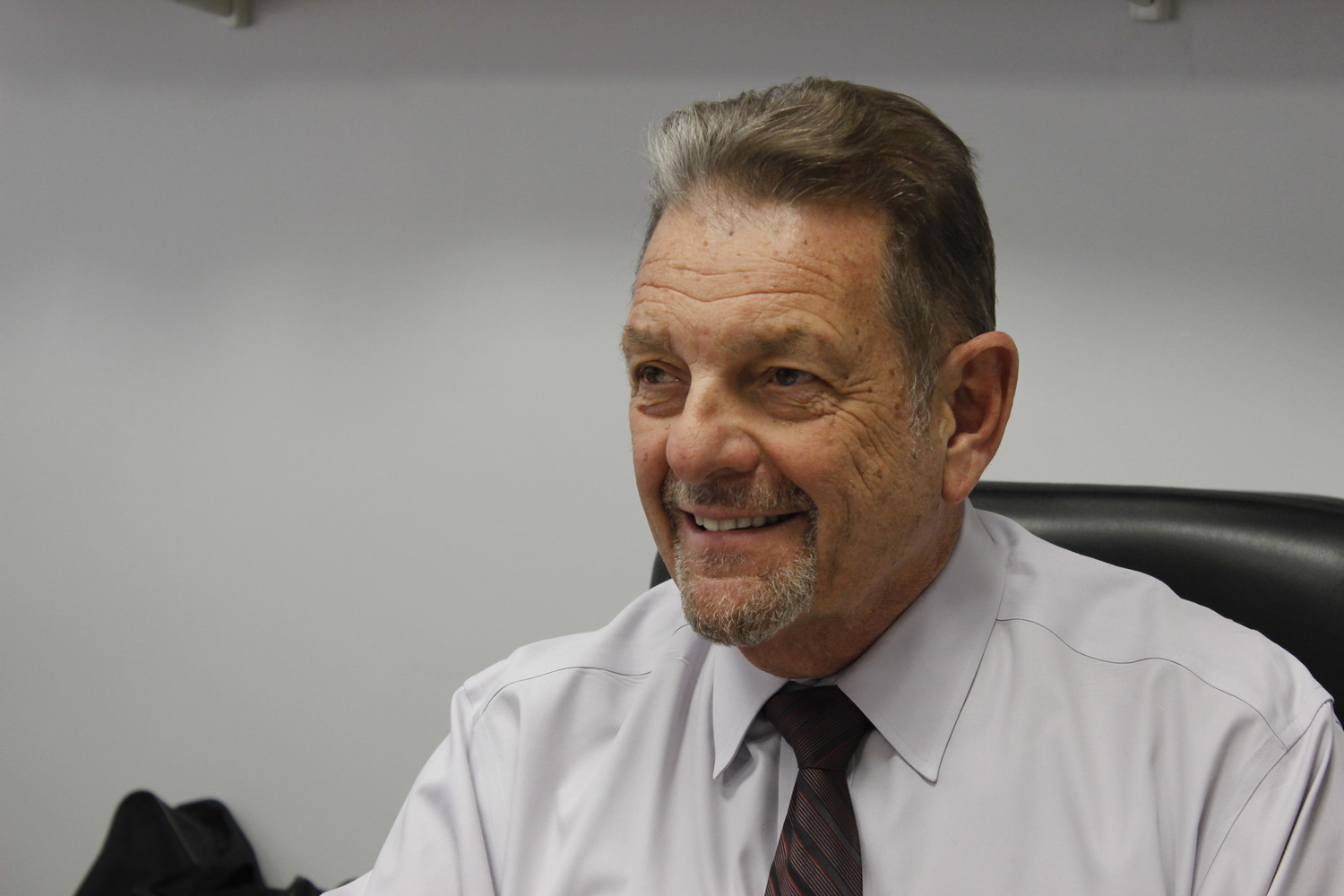Dr. Ed Fale looks back — and ahead
“I feel like we’re writing my eulogy,” joked Ed Fale, longtime superintendent of District 24. He gestured to his sinuses — he had earlier noted he was suffering from a nasty cold. “If this throat gets any worse, it may be!”
Fale, 69, has a tendency to brush things off like that, using a bit of humor. At the height of the Green Acres Mall tax breaks controversy in 2016, after media scrutiny and, at times, becoming the target of residents’ fury, he always seemed to keep cool. He once quipped to this reporter, “You should follow me around like this all the time — be my personal photographer,” during a heated board meeting.
He traded his usual happy-go-lucky attitude for a few tears when he announced last month that, after discussions with the school board about its vision for the future, he would not seek an extension of his contract, set to expire in June.
Board Vice President Tony Iadevaio told the Herald last month that it “wasn’t a unanimous decision” to hire a search firm, but declined to detail the differences in Fale’s and the board’s visions for the future. The board and representatives of District Wise Search Consultants will collect testimony from residents at the Jan. 31 regular meeting to build a profile to aid the search.
Fale began his career in education as a math teacher in 1970. He earned bachelor’s and master’s degrees in math education from Queens College and Fordham University, respectively, and then earned a doctorate in educational leadership from New York University.
He reflected on his tenure as superintendent in Valley Stream while in his office Monday morning as classical music played faintly in the background.
“It’s been an outstanding 20 years,” he said, glancing at a sheet of paper on which he scribbled notes. “I’ve loved every minute of being in Valley Stream School District 24 … I feel like I never worked a day in my life.”
He rattled off a few challenges he inherited as a first-time administrator: The Board of Education was divided on the issues; two of the district’s schools were on the state’s list of “failing” schools; and a construction project to add classrooms to a building had stalled.
He attributes his longevity in District 24 to quickly creating committees to examine some of these problems — inviting faculty and parents to be involved in the process. “People support what people create,” he said.
Though much has changed over the course of his 48-year education career, Fale said, he hopes that technology and curriculum strategies always put students first. That same philosophy was behind the district’s implementation of Yale University’s Emotional Literacy, or “Ruler” program — a research-based program to help children develop social and emotional skills.
“We said, we’ll volunteer our schools to be the pilot,” Fale said. “We want the research to be done here. And what we were able to do was document that the program was effective, and that social-emotional intelligence links with a happier child and increased test scores … That program has become fundamental to the culture of Valley Stream 24.”
Fale boasted that when Dr. Marc Brackett, who created the program for Yale, gives talks about how the program formed, “He talks about our district.”
In the early meetings about the Green Acres Mall tax breaks, Fale was the most vocal superintendent of the four in Valley Stream — fearful of what a $6.5 million tax shortfall created by the deal would do to the school district’s tax base. (A few years earlier, District 24 had weathered extensive program and staff cuts that upset many parents and teachers.)
But Fale says he has no regrets about sticking his neck out — that is merely part of his job, to be the public figure of the school district, and its interests.
Between February and July of last year, he temporarily moved to Valley Stream, living in Hawthorne Court while his Island Park home was elevated after being damaged in Hurricane Sandy.
“It introduced me to people who have younger children, but who may have been more apt to send their children to private schools,” Fale said. “It also, living there, introduced me to people who didn’t have any children in the school system and let me hear their perceptions of the community and things that they regarded as important.”
He added that living in Hawthorne Court “made me more understanding of the village’s long-range plan on what they are trying to do with high-density housing,” and made him decide that he “would move back to Valley Stream — and still might someday.”
On Trump, technology and educating children in a changing world
“I always believed we have to educate children for their future, not our past,” Fale said.
In light of the first year of the Trump administration and how it might affect work in the classroom, he repeated his guiding principle: Children have to be at the center of education. As unconventional and disturbing as national news has been over the past year, Fale thought that there were teachable moments for students.
“The American public schools were formed so that the kids who graduate from [them] could become productive parts of a democracy, and they would know how to make educated choices in voting and be good citizens,” he said. “That’s still a big part of education. You know, you’re teaching kids to be caring, productive, self-motivated members of a democracy.”
Students are inheriting a world in which communication is instantaneous and boundless, Fale said, which leaves room to make teaching social and emotional skills topical. President Trump’s and other public officials’ tendency to impulsively post statements online can be discussed in the context of the district’s emotional literacy program.
Even in his own life, he said, he tries to carefully weigh his words — cognizant of their power and sensitive to the needs of other people — so that what is said is really what is meant. He has a habit of interrupting himself when he gets off track — “no, that’s not right” — then readjusting until it is.
“I think a lesson that comes from that also is, maybe not to be so quick — all of us — in sending out a tweet, or putting something on Facebook,” Fale said with a shrug. “That it should be well-thought-out, and then you reflect: Is this what I really want to say?”

 48.0°,
Overcast
48.0°,
Overcast 







